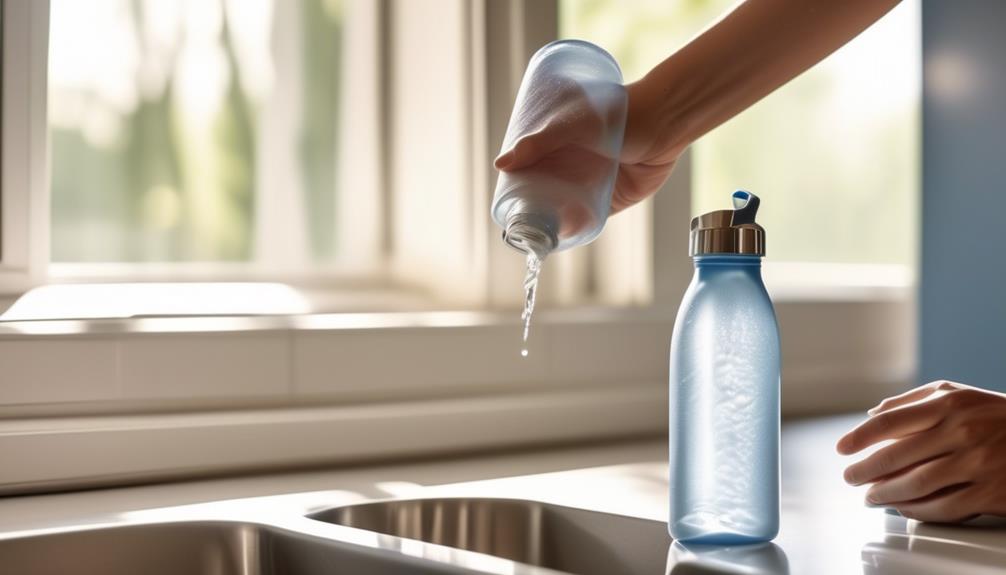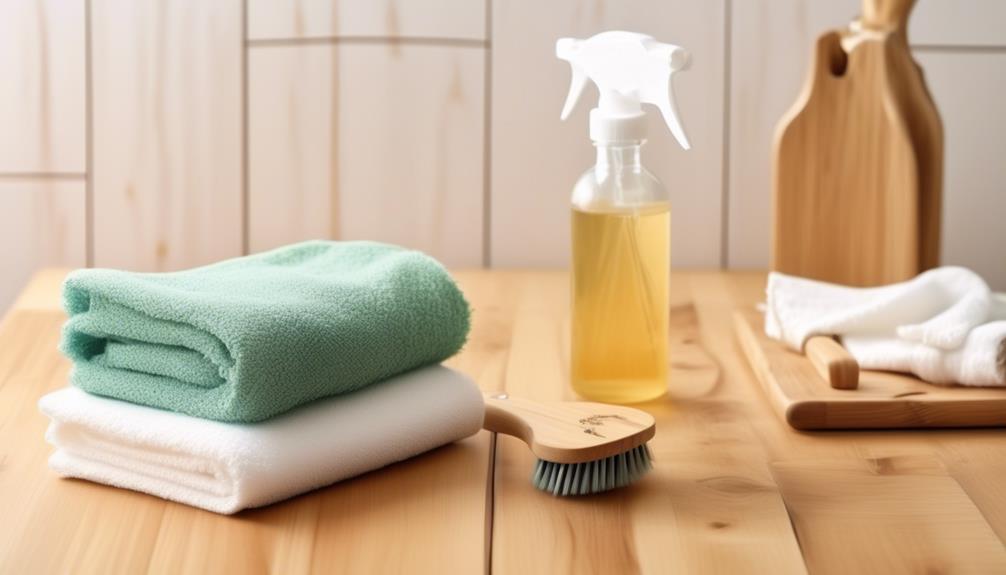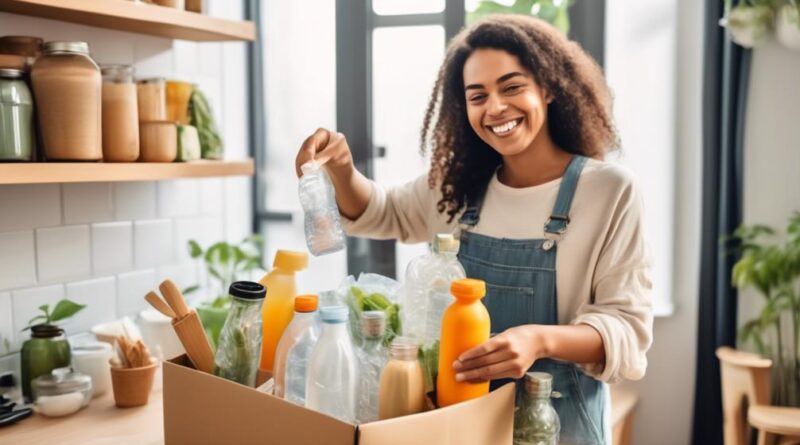How-To Switch to Eco-Friendly Plastic Alternatives
You've probably heard the phrase 'out with the old, in with the new' before, but when it comes to plastic use, it's more like 'out with the old, in with the eco-friendly.'
Making the switch to eco-friendly plastic alternatives is not only beneficial for the environment but also for your health and well-being. By exploring the various types of recyclable, biodegradable, and compostable plastics, as well as sustainable packaging, cutlery, and cleaning products, you can take significant steps towards reducing your plastic footprint.
But where do you begin?
Benefits of Eco-Friendly Alternatives

When considering eco-friendly alternatives, you'll find that they not only benefit the environment but also provide numerous advantages for your health and well-being.
The environmental impact of using eco-friendly alternatives is significant. By choosing products made from biodegradable materials or those that can be easily recycled, you contribute to reducing the amount of waste that ends up in landfills or oceans. This, in turn, helps to conserve natural resources and minimize pollution. Making this switch also supports the reduction of greenhouse gas emissions and energy consumption associated with the production and disposal of traditional plastics.
In addition to the positive environmental impact, opting for eco-friendly alternatives can also lead to various health benefits. Traditional plastics often contain harmful chemicals such as BPA and phthalates, which can leach into food and water, posing potential health risks. By using eco-friendly alternatives, you can minimize your exposure to these hazardous substances, thereby reducing the risk of related health issues.
Furthermore, many eco-friendly products are free from synthetic materials and chemicals, making them safer for both you and your family. This conscious choice can contribute to a healthier living environment and a reduced risk of allergies and respiratory problems.
Types of Recyclable Plastics
You can easily identify recyclable plastics by checking the recycling symbol on the product packaging. Understanding the different types of recyclable plastics can help you make more informed choices when selecting environmentally friendly options. In recent years, there have been exciting recyclable plastic innovations that have led to the development of environmentally friendly polymers.
One common recyclable plastic is PET (Polyethylene Terephthalate), which is often used for water and soda bottles. It's highly recyclable and can be turned into a variety of products such as clothing, carpets, and even new containers.
Another type is HDPE (High-Density Polyethylene), found in milk jugs, detergent bottles, and some plastic bags. This plastic is known for its strength and can be recycled into new bottles, plastic lumber, and bins.
PVC (Polyvinyl Chloride) is used in pipes, window frames, and siding. While it's less commonly recycled, advancements have been made in recycling technologies for PVC.
LDPE (Low-Density Polyethylene) is used in items like plastic bags and shrink wraps, and it can be recycled into new plastic bags, composite lumber, and floor tiles.
Finally, PP (Polypropylene) is found in yogurt containers, bottle caps, and straws, and it can be recycled into signal lights, battery cases, and brooms.
Understanding the types of recyclable plastics and the innovations in environmentally friendly polymers can empower you to make sustainable choices for the planet.
Biodegradable Plastic Options
Several biodegradable plastic options are available as sustainable alternatives to traditional plastics. Biodegradable packaging is one such option that's gaining popularity due to its ability to break down naturally, reducing the environmental impact of plastic waste. These materials are designed to decompose over time, leaving behind no harmful residues. Biodegradable packaging can include items such as food containers, cutlery, and bags, offering a more environmentally friendly choice for everyday use.
Sustainable textiles are another important aspect of biodegradable plastic alternatives. Fabrics made from biodegradable materials such as organic cotton, hemp, and bamboo offer an eco-friendly option for clothing, bedding, and other textile products. These materials aren't only biodegradable but also often require fewer resources to produce, making them a more sustainable choice overall.
When considering biodegradable plastic options, it's important to look for certifications such as the Biodegradable Products Institute (BPI) certification or the Seedling logo, which indicate that the product meets specific biodegradability standards. Additionally, it's crucial to dispose of biodegradable plastics properly, as they often require specific conditions to break down effectively.
Compostable Plastic Solutions
As you consider eco-friendly alternatives to traditional plastics, exploring compostable plastic solutions offers a promising avenue for reducing environmental impact. Compostable plastics are derived from sustainable materials and can be broken down into natural elements by microorganisms in the environment, making them an excellent choice for reducing plastic waste. When compostable plastics are disposed of in the green waste stream, they break down into organic matter, contributing to the production of nutrient-rich compost. This process helps divert waste from landfills and reduces the need for traditional plastic production.
One of the key advantages of compostable plastics is their ability to decompose into non-toxic components, leaving behind no harmful residue. This makes them an environmentally responsible choice for single-use items like food packaging, cutlery, and containers. By using compostable plastics, you can significantly reduce the environmental impact of your waste, as these materials offer a sustainable end-of-life solution.
It's important to note that proper disposal is crucial for realizing the environmental benefits of compostable plastics. When disposed of in the green waste stream, compostable plastics can effectively contribute to the production of high-quality compost, which can then be used to enrich soil and support plant growth. By embracing compostable plastic solutions, you can actively participate in reducing plastic pollution and promoting a more sustainable approach to waste management.
Sustainable Packaging Alternatives
When considering eco-friendly options, sustainable packaging alternatives present an opportunity to reduce environmental impact and promote responsible waste management. Sustainable food storage and environmentally friendly packaging solutions play a crucial role in minimizing ecological harm. As you seek to transition to sustainable packaging alternatives, consider options such as reusable silicone food bags, beeswax wraps, and stainless steel containers. These alternatives not only reduce single-use plastic consumption but also offer durable and long-lasting storage solutions for your food.
In addition to sustainable food storage options, eco-conscious consumers are increasingly turning to environmentally friendly packaging materials such as biodegradable paper packaging, compostable packaging made from plant-based materials, and packaging made from recycled materials. These choices help to minimize the environmental impact of traditional plastic packaging, which often ends up in landfills or oceans, contributing to pollution and harm to wildlife.
When opting for sustainable packaging alternatives, prioritize products that are certified as biodegradable or compostable, as these materials break down naturally over time, reducing the overall environmental impact. By making the switch to sustainable packaging alternatives, you can contribute to the reduction of plastic waste and support responsible waste management practices.
Embracing sustainable food storage and environmentally friendly packaging options empowers you to make a positive impact on the environment while still meeting your daily needs.
Eco-Friendly Cutlery and Utensils
Packing your lunch with sustainable food storage options? Consider eco-friendly cutlery and utensils as a convenient and eco-conscious choice for reducing single-use plastic waste. Reusable dinnerware and sustainable kitchenware are excellent alternatives to traditional plastic utensils, offering a durable and environmentally friendly option for your dining needs.
When choosing eco-friendly cutlery and utensils, look for materials such as bamboo, stainless steel, or even biodegradable options made from cornstarch or sugarcane. These materials aren't only reusable but also biodegradable, reducing the environmental impact associated with single-use plastics. Investing in a set of reusable dinnerware can significantly decrease the amount of plastic waste generated from disposable utensils, contributing to a more sustainable lifestyle.
Sustainable kitchenware encompasses a wide range of products, including reusable straws, utensils, plates, and bowls. These items are designed to be long-lasting, reducing the need for constant replacement and minimizing waste. By incorporating sustainable kitchenware into your daily routine, you can take a proactive step towards reducing your plastic footprint while enjoying the practicality and durability of these eco-friendly alternatives.
Switching to eco-friendly cutlery and utensils is a simple yet impactful way to embrace sustainability in your daily life. With a wide variety of options available, making the switch to reusable dinnerware and sustainable kitchenware is a practical and effective choice for reducing single-use plastic waste.
Green Cleaning Product Substitutes

Consider swapping out your conventional cleaning products for eco-friendly alternatives to reduce your environmental impact and promote a healthier living space.
Natural disinfectants are an excellent green cleaning product substitute. You can easily make a natural disinfectant by mixing equal parts of water and white vinegar in a spray bottle. This solution effectively kills germs and bacteria without the use of harsh chemicals, providing a safer and eco-friendly option for cleaning surfaces in your home. Additionally, essential oils such as tea tree oil, lavender oil, or eucalyptus oil can be added to the natural disinfectant mix for extra antimicrobial properties and a pleasant scent.
DIY cleaners are another great alternative to traditional cleaning products. You can create your own all-purpose cleaner by mixing water, castile soap, and essential oils. This homemade cleaner is effective for various surfaces and is free from harmful chemicals, reducing the negative impact on the environment.
Baking soda is also a versatile ingredient for DIY cleaning. Its abrasive texture makes it perfect for scrubbing and removing tough stains, while its natural properties help neutralize odors.
Eco-Friendly Straws and Drinkware
Looking for sustainable alternatives for your drinkware and straws? Making the switch to eco-friendly options is easier than you think.
When it comes to straws, reusable options are the way to go. Consider investing in reusable straws made from stainless steel, bamboo, or silicone. These alternatives aren't only durable but also easy to clean and maintain. Plus, they come in various sizes and styles to suit different beverage types. By opting for reusable straws, you can significantly reduce your plastic waste and lessen your environmental impact.
In addition to reusable straws, glassware options are also worth exploring. Glass is a fantastic eco-friendly material that's both elegant and practical. Look for glassware sets made from recycled glass or consider upcycling existing glass containers for use as drinking glasses.
Not only are you reducing single-use plastic consumption, but you're also adding a touch of sophistication to your table setting. From tumblers to wine glasses, there's a wide range of glassware options available to elevate your drinking experience while being eco-conscious.
Frequently Asked Questions
How Can I Properly Dispose of Eco-Friendly Plastics to Ensure They Are Recycled or Composted?
To properly dispose of eco-friendly plastics and ensure they're recycled or composted, there are a few steps you can follow:
- Check with your local waste management facility: First, check with your local waste management facility to see if they accept eco-friendly plastics for recycling or composting. Different facilities may have different guidelines, so it's important to know what is allowed in your area.
- Separate eco-friendly plastics from regular plastics: Once you know that your local facility accepts eco-friendly plastics, make sure to separate them from regular plastics. This will make it easier for the facility to properly handle and process them.
- Follow recycling or composting guidelines: It's important to follow the guidelines for recycling or composting in your area. This may include specific instructions on how to prepare the eco-friendly plastics for disposal. For example, some facilities may require you to remove labels or caps before recycling.
- Clean and dry the eco-friendly plastics: Before disposing of eco-friendly plastics, make sure to clean and dry them. This will help prevent contamination and ensure that the plastics can be properly recycled or composted.
Are There Any Eco-Friendly Plastic Alternatives That Are Suitable for Hot or Cold Food and Beverages?
When it comes to eco-friendly packaging for hot or cold food and drinks, there are several alternatives that prioritize food safety.
Look for options made from materials like plant-based plastics, biodegradable PLA, or compostable bagasse.
These alternatives are suitable for a range of temperatures and are designed to meet food safety standards.
Consider switching to these eco-friendly options to reduce the environmental impact of traditional plastics while ensuring food safety.
What Are Some Cost-Effective Options for Switching to Eco-Friendly Plastics in My Household or Business?
To find cost-effective options for eco-friendly plastics in your household, consider reusable alternatives like silicone food storage bags, stainless steel straws, and bamboo utensils. These options are durable and can help you cut down on single-use plastic waste.
Additionally, look for compostable or biodegradable disposable tableware for events or business use. Making these switches can reduce your environmental impact without breaking the bank.
Are There Any Regulations or Certifications to Look for When Purchasing Eco-Friendly Plastic Products?
When purchasing eco-friendly plastic products, look for regulatory standards and certifications such as the USDA Organic seal or the Forest Stewardship Council certification. These indicate that the product meets specific environmental impact measurement criteria and adheres to sustainable practices.
Can Eco-Friendly Plastic Alternatives Be Used in the Microwave or Dishwasher?
When it comes to microwave safety, eco-friendly plastic alternatives can vary. Some are microwave-safe, but always check the label for confirmation.
Dishwasher compatibility also differs – some eco-friendly plastics can handle the dishwasher, while others may warp or degrade. Always look for products labeled as dishwasher-safe to ensure they can handle the heat and pressure.
Checking the product labels for both microwave and dishwasher compatibility is crucial for using eco-friendly plastic alternatives.
Conclusion
So, now that you know about the benefits of eco-friendly alternatives and the different types available, it's time to make the switch.
From recyclable plastics to biodegradable options, sustainable packaging, and green cleaning products, there are plenty of eco-friendly choices out there.
By making the switch to these alternatives, you can reduce your environmental impact and contribute to a healthier planet for future generations.
It's a small change that can make a big difference.
